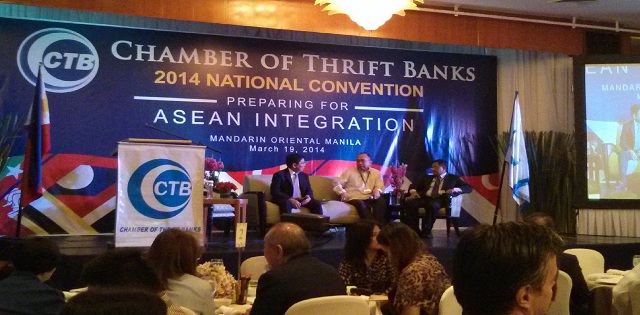ADVERTISEMENT
Filtered By: Money
Money
Thrift banks want MSME law amended, more agri-related infrastructure for small business
Text and photo by DANESSA O. RIVERA, GMA News

The Chamber of Thrift Banks holds a national convention on Wednesday, 19 March 2014, in Makati City, focusing on how to comepete under an integrated ASEAN market.
The Chamber of Thrift Banks (CTB) is asking government to relax mandatory credit requirements under the micro, small, medium enterprises (MSMEs) law so more thrift banks can comply.
The umbrella organization for thrift banks is also urging government to focus on agriculture-related infrastructure so that MSMEs doing business in sector may mitigate costs and losses.
Some CTB members find it hard to comply with the required credit allocation because the MSME is not their niche market, president Jose Teodoro Limcaoco said during the chamber's National Convention in Makati City Wednesday.
“Rather than imposing penalties, the government should provide a window for other alternative compliance, so that under-complied banks will not be heavily burdened by penalties which small banks may not be in a position to handle given their limited capital or resources,” he said.
The chamber is proposing a 10 percent general compliance by thrift banks to the mandatory credit allocation provision of the MSME law.
The current provision requires banks to set aside at least 8 percent of total loan portfolio for micro and small enterprises and at least 2 percent for medium enterprises, based on their balance sheet as of the end of the previous quarter, and make it available under MSME credit.
CTB executive director Suzanne Felix said the 10 percent proposal will allow thrift banks to serve their niche market.
"Rural banks find it hard to comply with the 2 percent requirement for medium enterprises while the big thrift banks with the 8 percent requirement for micro and small enterprises," she said.
"With the proposal, there will be less banks to be penalized," she added.
Bangko Sentral ng Pilipinas (BSP) Deputy Governor Nestor Espenilla Jr. acknowledged the challenges in mandatory credit, but noted the law is the law.
"It is what it is and BSP will implement it. We will penalize [non-compliant banks] because it is the law," he said.
The CTB is also urging the government to fast-track efforts at making the agriculture sector more efficient and competitive so MSMEs will achieve lower cost for products and incur less wastage.
Limcaoco said the agriculture sector is not able to accept and payback loans due to infrastructure issues like lack of storage and farm-to-market roads.
“In helping the Agri-Agra sector, banks could suffer in the form of higher non-performing loan ratios. Credit losses are naturally recovered by charging higher rates,” Limcaoco said.
Lending requirements are contained under Republic Act (RA) 10000 or “The Agri-Agra Reform Credit Act of 2009,” which was approved on February 23, 2010 and amended Presidential Decree (PD) 717 signed by then President Ferdinand Marcos on May 29, 1975.
Limcaoco said these proposals are all in line with the preparation for the Association of Southeast Asian Nations (ASEAN) integration by 2015.
"We have to understand how ASEAN integration affects our customers, what this would mean to them. We also need to work hand-in-hand with the government. We need their support in amending laws affecting mandatory credit requirements,” he added. – VS, GMA News
More Videos
Most Popular




